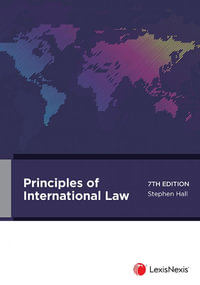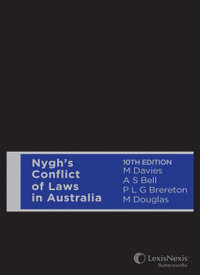
A History of the Laws of War
Volume 2: The Customs and Laws of War with Regards to Civilians in Times of Conflict
Hardcover | 7 October 2011 | Edition Number 1
At a Glance
324 Pages
24.38 x 17.27 x 2.54
Hardcover
RRP $180.00
$132.25
27%OFF
or 4 interest-free payments of $33.06 with
orAims to ship in 5 to 10 business days
This second book on civilians examines four different topics. The first topic deals with the targetting of civilians in times of war. This discussion is one which has been largely governed by the developments of technologies which have allowed projectiles to be discharged over ever greater areas, and attempts to prevent their indiscriminate utilisation have struggled to keep pace. The second topic concerns the destruction of the natural environment, with particular regard to the utilisation of starvation as a method of warfare, and unlike the first topic, this one has rarely changed over thousands of years, although contemporary practices are beginning to represent a clear break from tradition. The third topic is concerned with the long-standing problems of civilians under the occupation of opposing military forces, where the practices of genocide, collective punishments and/or reprisals, and rape have occurred. The final topic in this volume is about the theft or destruction of the property of the enemy, in terms of either pillage or the intentional devastation of the cultural property of the opposition.
As a work of reference this set of three books is unrivalled, and will be of immense benefit to scholars and practitioners researching and advising on the laws of warfare. It also tells a story which throws fascinating new light on the history of international law and on the history of warfare itself.
'The law impacts on modern military operations at all levels. The importance of understanding the influence of international law, and the constraints, which it places upon the conduct of armed conflict, is an essential area of study. Dr Alexander Gillespie's three volume work traces the development and scope of this law from the earliest times through the modern day. In doing so he identifies constant themes and common principles in the law, as well, unfortunately, as all too common breaches. Commanders and historians, as well as lawyers, will find this book of great value. It is written in a practical and useful style and brings to light many fascinating examples of the law at work in times of war from which contemporary lessons can be learned'.
Brigadier Kevin Riordan, Director General of Defence Legal Services for the New Zealand Defence Forces.
'The span of scholarship on offer in these volumes is astonishing.an extraordinary gathering of historical and legal materials many of which record the most sombre and tragic events of human history - war in all its terrible forms.'
Rt Hon Sir Geoffrey Palmer, Former Prime Minister of New Zealand
'At a time of real challenge, Alexander Gillespie is to be commended for his monumental and significant contribution to our understanding of the context, practice and principles that govern war and armed conflict. This vital book is an indispensable part of any library, and will be a necessary resource for governments, NGOs, international organisers, academics and lawyers involved in the issues.'
Professor Philippe Sands QC, University College London
'This is a comprehensive and comprehensible account of the laws of, against and about war. It is both authoritative and accessible - Alexander Gillespie's great achievement is to provide a map for a better future, in which the inevitable horrors of armed conflict are recognised and minimised, and those who instigate them unlawfully are punished by international courts. This is a must-read for all concerned to ensure that war laws do not end up in the graveyard of good words.'
Geoffrey Robertson QC, founder and head of Doughty Street Chambers, author of Crimes Against Humanity (Penguin and The New Press)
Industry Reviews
The wealth of materials compiled and reviewed by Alexander Gillespie for the purpose of this book is breath-taking and one can suspect that Alexander Gillespie's books will become the mandatory starting point for anyone wishing to study the history of the laws of war in the future. -- Vincent Roobaert * NATO Legal Gazette, Issue 27 *
...libraries and professors who focus on the many elements of the [law of war] would be wise to have all three volumes at hand. Together, they provide a vivid, detailed, and especially readable account of the [law of war]. This set is destined to be described by all holders as a richly adorned, and affordable, research treasure trove. * American Society of International Law Newsletter, Issue #43 *
Review of A History of the Laws of War and The Causes of War, Volume 1 ...unique and of unquestionable relevance... both works are appreciable for the impressive quantity of the historical and legally pertinent materials gathered by the author. This is useful from the perspective of understanding the background of today's rules on the recourse to armed force and international humanitarian law. -- Carlo Focarelli * Italian Yearbook of International Law, Volume 23, 2013 *
This is a comprehensive and comprehensible account of the laws of, against and about war. It is both authoritative and accessible - Alexander Gillespie's great achievement is to provide a map for a better future, in which the inevitable horrors of armed conflict are recognised and minimised, and those who instigate them unlawfully are punished by international courts. This is a must-read for all concerned to ensure that war laws do not end up in the graveyard of good words. -- Geoffrey Robertson QC, founder and head of Doughty Street Chambers, author of Crimes Against Humanity (Penguin and The New Press)
The law impacts on modern military operations at all levels. The importance of understanding the influence of international law, and the constraints, which it places upon the conduct of armed conflict, is an essential area of study. Dr Alexander Gillespie's three volume work traces the development and scope of this law from the earliest times through the modern day. In doing so he identifies constant themes and common principles in the law, as well, unfortunately, as all too common breaches. Commanders and historians, as well as lawyers, will find this book of great value. It is written in a practical and useful style and brings to light many fascinating examples of the law at work in times of war from which contemporary lessons can be learned. -- Brigadier Kevin Riordan, Director General of Defence Legal Services for the New Zealand Defence Forces
The scourge of war never ends. If we are ever to be rid of it we need to understand the warlike history of homo sapiens. Professor Gillespie in his unique work tells us what we need to know. Will we heed it? -- Sir Geoffrey Palmer, former, Prime Minister of New Zealand, President of the New Zealand Law Commission, and chair of the UN Inquiry Panel into the Gaza Bound Flotilla of 2010
The span of scholarship on offer in these volumes is astonishing...an extraordinary gathering of historical and legal materials many of which record the most sombre and tragic events of human history - war in all its terrible forms. -- Rt Hon Sir Geoffrey Palmer, Former Prime Minister of New Zealand
At a time of real challenge, Alexander Gillespie is to be commended for his monumental and significant contribution to our understanding of the context, practice and principles that govern war and armed conflict. This vital book is an indispensable part of any library, and will be a necessary resource for governments, NGOs, international organisers, academics and lawyers involved in the issues. -- Professor Philippe Sands QC, University College London
I. Targets
1. Projectiles, Fire and Defended Areas
2. International Law on Projectiles Prior to the First World War
3. Between the Wars
4. The Second World War
5. The Nuremberg Trials and the 1949 Geneva Conventions
6. Between 1949 and 1977
7. The 1977 Additional Protocol 1 to the Geneva Conventions
8. From 1980 to the New Century
II. Starvation
1. The Beginnings of Siege, Blockade and Scorched Earth
2. From the Enlightenment to the Twentieth Century
3. The First World War
4. The Second World War
5. After 1945
6. Two New Conventions and the Additional Protocols
7. Scorched Earth Between 1980 and the Twenty-first Century
8. Starvation in War Between 1980 and the Twenty-first Century
III. Occupation
1. T he First Literate Civilisations
2. Ancient Israel
3. T he Greeks
4. T he Romans
5. T he Middle Ages
6. Forward from the Renaissance
7. The Enlightenment
8. International Humanitarian Law Emerges
9. Two Bad Decades
10. The First World War
11. The Armenian Genocide
12. Between the Wars
13. The Second World War
14. Examining the Killing of Civilians at Nuremberg
15. The 1948 Convention on the Prevention and Punishment of the Crime of Genocide
16. The 1949 Convention (IV) Relative to the Protection of Civilian Persons in Time of War
17. Between 1949 and 1977
18. The 1977 Additional Protocols and the 1979 Hostage Convention
19. Between Pol Pot and Saddam Hussein
20. The Wars of the 1990s
21. The International Criminal Court and its Aftermath
IV. Property
1. Beginnings
2. The Greeks and the Romans
3. The Dark Ages
4. The Crusading Period
5. The High Middle Ages and the Renaissance
6. The Reformation and Early Enlightenment
7. The Nineteenth Century
8. The First Half of the Twentieth Century
9. The Second World War
10. Forward From 1954
11. Realigning the Last Decades of the Twentieth Century
Conclusion
1. Targeting Civilians
2. Is Starvation a Restricted Method of Warfare?
3. Are the Practices in Times of Occupation, with Particular Regard to Genocide, Reprisals and Rape Better or Worse than in the Past?
4. Is Property Safe from Pillage and Unnecessary Destruction?
ISBN: 9781849462051
ISBN-10: 1849462054
Published: 7th October 2011
Format: Hardcover
Language: English
Number of Pages: 324
Audience: Professional and Scholarly
Publisher: BLOOMSBURY 3PL
Country of Publication: GB
Edition Number: 1
Dimensions (cm): 24.38 x 17.27 x 2.54
Weight (kg): 0.73
Shipping
| Standard Shipping | Express Shipping | |
|---|---|---|
| Metro postcodes: | $9.99 | $14.95 |
| Regional postcodes: | $9.99 | $14.95 |
| Rural postcodes: | $9.99 | $14.95 |
How to return your order
At Booktopia, we offer hassle-free returns in accordance with our returns policy. If you wish to return an item, please get in touch with Booktopia Customer Care.
Additional postage charges may be applicable.
Defective items
If there is a problem with any of the items received for your order then the Booktopia Customer Care team is ready to assist you.
For more info please visit our Help Centre.
You Can Find This Book In
This product is categorised by
- Non-FictionLawInternational LawPublic International LawInternational Humanitarian Law
- Non-FictionLawJurisprudence & General IssuesLegal History
- Non-FictionHistoryMilitary History
- Non-FictionWarfare & Defence
- Non-FictionLawJurisprudence & General IssuesLegal Skills & Practice
- Non-FictionLawLaws of Specific JurisdictionsConstitutional & Administrative Law























